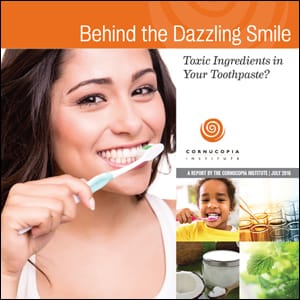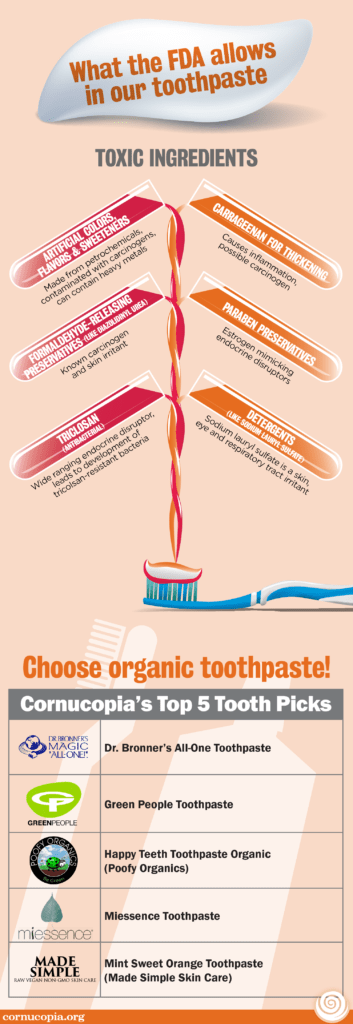[Read Cornucopia’s letter to the FDA.]
Scorecard Identifies Brands without Toxics
 The Cornucopia Institute, an organic industry watchdog, has sent the FDA a letter requesting that the agency ban a possible carcinogen, triclosan, from toothpastes, as they have recently done for hand soaps.
The Cornucopia Institute, an organic industry watchdog, has sent the FDA a letter requesting that the agency ban a possible carcinogen, triclosan, from toothpastes, as they have recently done for hand soaps.
The agency prohibited the use of the chemical in hand soaps on September 6. Triclosan has been linked to skin irritation, endocrine disruption, breast cancer, allergies in children, and weakened muscle function.
“If this chemical is not safe to wash your hands with, then we should also remove it from products that you put directly in your mouth,” asserts Mark Kastel, Senior Policy Analyst at The Cornucopia Institute.
Cornucopia’s latest report, Behind the Dazzling Smile: Toxic Ingredients in Your Toothpaste, describes how even the quality of “natural” toothpastes varies significantly between brands and how these personal oral care products commonly include nonessential ingredients that may be harmful.
“The cosmetics industry is no different, and may be worse, than leading food companies when it comes to gimmicky ingredients and misleading health claims,” asserts the report’s lead author Jerome Rigot, PhD, a Cornucopia staff scientist. “However, we have created a useful web-based scorecard to help discriminating consumers see through marketing hype and make the best decision for their family when buying toothpaste.”
 Behind the Dazzling Smile emphasizes that the mouth’s oral mucosa is one of the most absorbent areas of the body and allows potentially harmful ingredients to pass directly into the bloodstream.
Behind the Dazzling Smile emphasizes that the mouth’s oral mucosa is one of the most absorbent areas of the body and allows potentially harmful ingredients to pass directly into the bloodstream.
Triclosan, an antimicrobial chemical, was introduced into the market in 1972. At that time its use was limited to hospital and health care applications. Since then, triclosan’s commercial usage has increased exponentially and it can be found in hundreds of consumer products ranging from antibacterial soaps, deodorants, toothpastes and other cosmetics, fabrics, toys and other household and personal care products.[1]
Triclosan is just one of a myriad of synthetic materials banned in Europe and other developed countries that can be found in toothpastes sold in the U.S.
The FDA restricts or prohibits just 11 synthetic ingredients in cosmetics.[2] In comparison, the European Union (EU) prohibits over 1,300 ingredients and restricts an additional 250 ingredients for use in personal care products.[3] As a result, the U.S. lags significantly behind other countries on cosmetics safety, allowing many hazardous chemicals that are banned in Canada, Japan and Europe.[4]
In fact, many toothpastes sold in Europe, and other countries, by American corporations are created with different, safer formulations for international markets compared to the same products sold in the U.S., complying with stricter cosmetics laws.
The Cornucopia Institute began investigating toothpaste as an extension of their work focusing on the potentially carcinogenic food additive carrageenan.
Carrageenan is an additive that reliably produces inflammation in the body and yet it is still commonly found in organic foods, like cream, chocolate milk, and yogurt. Carrageenan is also found in natural brands of toothpaste. Like triclosan, the Cornucopia report and scorecard identifies carrageenan when identifying the best options in the marketplace.
“Consumers are increasingly choosing a certified organic diet to reduce their overall toxic load and to secure food that is nutritionally superior,” stated Kastel. “Many are now realizing that anything they put on their skin, or use in their mouths like mouthwash and toothpaste, will end up in their bloodstream. And many of these synthetic compounds are the last thing we want to expose our families to, especially children.”
Cornucopia’s extensively researched report and toothpaste brand scorecard spotlight the most problematic ingredients to be avoided, which are commonly present in some of the most popular “natural” and premium brands as well as familiar mass-market brands like Colgate and Crest. Several toothpastes rank at the top of the toothpaste at the top of the “five-brush” category (on a scale of 1-5), and are among the best and safest products available in the market.
The Cornucopia Institute’s report and scorecard, Behind the Dazzling Smile: Toxic Ingredients in Your Toothpaste, is available at: www.cornucopia.org.
[1] http://beyondpesticides.org/programs/antibacterials/triclosan/products-containing-triclosan
[2] http://www.fda.gov/Cosmetics/GuidanceRegulation/LawsRegulations/ucm127406.htm#prohibited
[3] http://eur-lex.europa.eu/legal-content/EN/TXT/HTML/?uri=CELEX:32009R1223&from=EN
[4] http://www.breastcancerfund.org/big-picture-solutions/make-our-products-safe/making-cosmetics-safe.html

